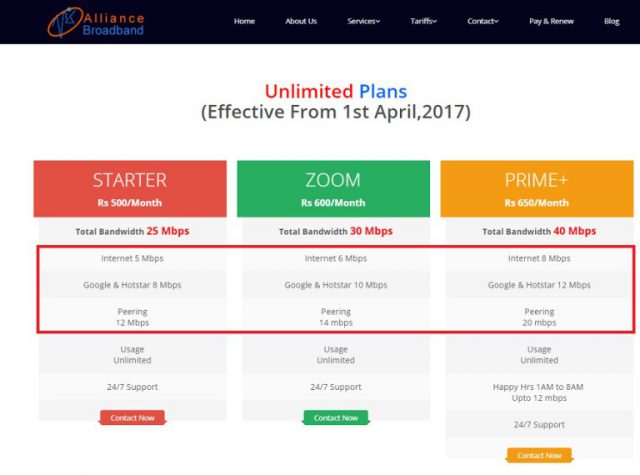Unclear and unenforced Net Neutrality rules in India give a cautionary tale to U.S. internet users who could soon find Net Neutrality guarantees replaced in the U.S. with industry-written rules filled with loopholes or no Net Neutrality protections at all.
As India considers stronger enforcement of Net Neutrality protection, broadband providers have been merrily violating current Net Neutrality guidelines with fast lanes, sometimes advertised openly. Many of those ISPs are depending on obfuscation and grey areas to effectively give their preferred partners a leg up on the competition while claiming they are not giving them preferential treatment.
Medianama notes Ortel advertises two different internet speeds for its customers – one for regular internet traffic and the other for preferred partner websites cached by Ortel inside its network. The result is that preferred websites load 10-40 times faster than regular internet traffic.
Ortel’s vice president of broadband business, Jiji John, said Ortel is not violating Net Neutrality.
“Cache concept is totally based on the Internet user’s browsing. ISP does not control the contents and it has nothing to do with Net Neutrality,” John said in a statement.
Critics contend ISPs like Ortel may not control the contents of websites, but they do control which websites are cached and which are not.
Alliance Broadband, a West Bengal-based Internet provider, goes a step further and advertises higher speeds for Hotstar — a legal streaming platform, Google and popular movie, TV and software torrents, which arrive at speeds of 3-12Mbps faster than the rest of the internet. Alliance takes this further by establishing a reserved lane for each service, meaning regardless of what else one does with their internet connection, Hotstar content will arrive at 8Mbps, torrents at 12Mbps and the rest of the internet at 5Mbps concurrently. This means customers can get up to 25Mbps when combining traffic from the three sources, even if they are only subscribed to a much slower tier.
Which services are deemed “preferred” is up to the ISP. While Alliance may favor Google, Wishnet in West Bengal offers up preferential speeds for YouTube videos.
The ISPs claim these faster speeds are a result of “peering” those websites on its own internal network, reducing traffic slowdowns and delays. In some cases, the ISPs store the most popular content on its own servers, where it can be delivered to customers more rapidly. This alone does not violate Net Neutrality, but when an ISP reserves bandwidth for a preferred partner’s website or application, that can come at the expense of those websites that do not have this arrangement. Some ISPs have sought to devote extra bandwidth to those reserved lanes so it does not appear to impact on other traffic, but it still gives preferential treatment to some over others.
Remarkably, Indian ISPs frequently give preferential treatment to peer-to-peer services that routinely flout copyright laws while leaving legal streaming services other than Hotstar on the slow lane, encouraging copyright theft.
American ISPs have already volunteered not to block of directly impede the traffic of websites, but this may not go far enough to prevent the kinds of clever preferential runarounds ISPs can engineer where Net Neutrality is already in place, but isn’t well defined or enforced.


 Subscribe
Subscribe


Phillip,
It would be interesting to see what companies that are in the fast lane are also owned by these ISP’s. Do you have any information on that? I think that would enrage people even more if that sort of situation were to be found.
At present in India, the kind of “synergy” between telecom companies and content providers is not as advanced as in Europe and North America. In April 2015, Airtel, which is the largest ISP in India, launched a marketing platform called Airtel Zero, which allowed application providers to pay for the data used by the consumers, enabling consumers to access specific mobile apps at zero data cost. Notice they targeted this at app developers and not content companies. A lot of Indians are not using 4G LTE wireless technology, but still rely on 3G and EDGE connectivity, so they are about… Read more »
Thank you, Phillip! Appreciate the feedback.